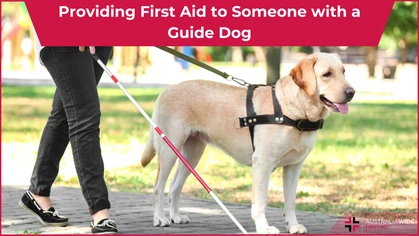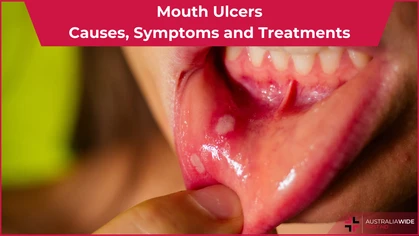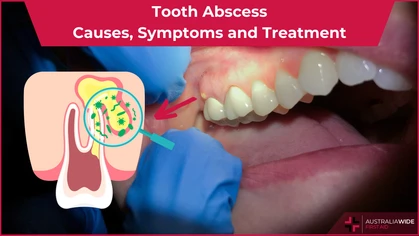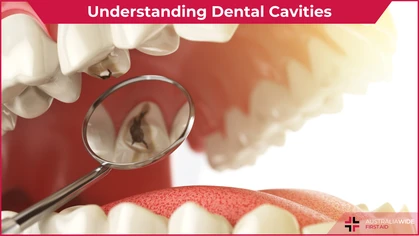Healing Through Nutrition: Best Foods for a Speedy Recovery

General Health-Related
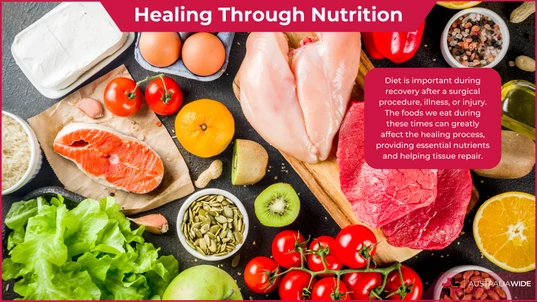 Diet is important during recovery after a surgical procedure, illness, or injury. The foods we eat during these times can greatly affect the healing process, providing essential nutrients and helping tissue repair.
But what light foods are recommended after surgery, and how do certain foods aid healing? Which foods are best suited for promoting recovery when feeling under the weather? Let's find the recovery foods for healing so you can make informed dietary choices during these crucial times.
Diet is important during recovery after a surgical procedure, illness, or injury. The foods we eat during these times can greatly affect the healing process, providing essential nutrients and helping tissue repair.
But what light foods are recommended after surgery, and how do certain foods aid healing? Which foods are best suited for promoting recovery when feeling under the weather? Let's find the recovery foods for healing so you can make informed dietary choices during these crucial times.
The Power of Nutrition in Recovery
A healthy, fruitful lifestyle starts with proper nutrition. The right food leads to healthy and productive living. Nutrition is involved in supporting growth and development as well as tissue repair processes and the operations performed by major body organs. Your dietary choices either contribute positively or negatively to the healing process. Here's why proper nutrition is important for fast recovery:- Pain control
- Repair damaged tissue
- Reduce muscle loss
- Maintain energy levels
- Avoid constipation
- Prevent dehydration
What to Eat When Sick?
Appetite reduces during sickness, and people avoid food, thinking it will worsen the condition. But some foods can make you feel better and help you get well faster. Let's find out the best foods to eat when sick: Chicken Soup and Broths They provide essential fluids and electrolytes that can be beneficial during illness. When served hot, they help to improve sinus congestion. Soups and broths are flavourful, nutrient-rich, and gentle on your digestion. BRAT Diet A special BRAT (Banana, Rice, Applesauce, and Toast) diet is recommended for adults and kids suffering from diarrhoea or vomiting to provide adequate nutrition. Add mild meals like saltine crackers, plain potatoes, or clear soup broths to the BRAT diet. Avoid dairy, sugary, and fatty foods, which may worsen nausea or diarrhoea. Skinless Baked Lean Meat When dealing with diarrhoea or an upset stomach, you might experience reduced appetite. Instead of fasting, go for bland options like baked chicken or turkey without the skin. These gentle-to-digest foods won't irritate your stomach. Beans Kidney beans, black beans, and soybeans are high in fibre and can help relieve constipation by softening your stool. Dried beans also provide magnesium, which can ease the body and reduce muscle aches. Cereal and Oatmeal Eat refined white flour cereals like cream of wheat and cornflakes, as they are low in fibre and can assist in managing symptoms of diarrhoea. For constipation, choose high-fibre meals like whole grain oatmeal and bran flour cereals because they have the much-needed fibres that help regulate bowel movements. Eggs Add cooked eggs to your bland diet if you're suffering from diarrhoea, nausea, or vomiting. Consume smaller, more frequent portions, and chew eggs slowly to reduce stress on your stomach.
Soups can be a great option - full of nutrients, hydrating, and easy to eat.
Drinks To Build Up Strength During Illness
When it comes to staying hydrated during illness, water stands out as the best choice. Not only does it quench your thirst, but it also detoxifies your body. You can enjoy these beverages during illness:- Hot tea
- Ginger tea
- Coconut water
- Golden milk (made from turmeric and milk can reduce cold and flu symptoms)
- Herbal tea sweetened with honey
- Honey and lemon tea
- Natural fruit juices (without added sugars)
Foods to Avoid During Sickness
Some foods can either relieve or worsen the symptoms when you're sick. Based on the symptoms, avoid the following foods to expedite your recovery:- Headaches and Migraines: Skip aged cheeses with tyramine, caffeine, artificial sweeteners, and red wine to avoid triggering headaches.
- Sore Throat: Avoid hard, crunchy foods like potato chips, granola, nuts, and cold lemonade or citrus juices that may irritate a sore throat.
- Runny Nose: Avoid dairy products if you have a runny nose. Milk, yogurt, and ice cream can thicken phlegm and increase mucus production. Spicy foods and sweets should also be avoided.
- Diarrhoea: Don't eat sugarless candy and sorbitol gums because they can increase the frequency of diarrhoea. Avoid eating beans, peas, broccoli, corn, peppers, full-fat dairy products, and fried foods.
- Nausea: Avoid full-fat dairy products, caffeine, and greasy foods, as they make you feel like throwing up.
- Constipation: Avoid low-fibre options like dairy products, high-fat meats, processed foods, and sugary sweets if you have constipation.
The Best Foods for Injury Recovery
For athletes and active individuals recovering from injuries, smart nutrition is important to return stronger and healthier. Here are the best foods for recovery from an injury: Colourful Salads Include colourful vegetables in your daily salad for faster recovery. Use spinach or arugula as the salad base. Add orange carrots, spinach, red and green bell peppers, olives, purple cabbage, and white onions. Go easy on the dressing to keep it healthy. Mixed Nuts Nuts contain unique vitamins, rare minerals, healthy fats, and protein. Different nuts provide essential nutrients and trace elements that our bodies need in small amounts. Smoothies Citrus fruits like oranges and pineapples are rich in healing minerals and immune-boosting properties. Make delicious smoothies with bananas, colourful berries, yogurt, and protein powder. Sweet Potatoes Sweet potatoes contain soluble fibre, Vitamins A, B, and C, iron, calcium, selenium, and antioxidants. Baked sweet potatoes with savoury or sweet spices can improve the recovery process. Seafood Salmon, trout, and shellfish are rich in protein, Omega-3 fatty acids, and healthy fats. They improve the body's natural healing processes. Shellfish is rich in zinc, which is important for the healing process and can speed up recovery.Avoid These Foods for a Fast Recovery
It is important to understand what not to eat when injured for a smooth recovery. These foods should be avoided because they can block nutrient absorption and hinder the production of collagen and elastin:- Sugar: High-glycemic foods, rich in sugar and refined carbohydrates, can break down collagen and elastin through glycation, reducing the proteins available for skin healing.
- Alcohol: Alcohol blocks the absorption of key nutrients, including proteins, vitamins (A, C, D, E, K, and B), and minerals like zinc, essential for collagen and elastin production.
- Caffeine: Excessive caffeine intake can reduce nutrient absorption and weaken the skin by acting as a diuretic, expelling water from the body. This leads to a dual effect: insufficient nutrients in the bloodstream and limited nutrient supply to the wound due to reduced blood volume.
- Sodium-rich foods: Salty foods, such as canned and processed meats, can damage blood vessels around the wound, hindering the flow of important nutrients to the site.
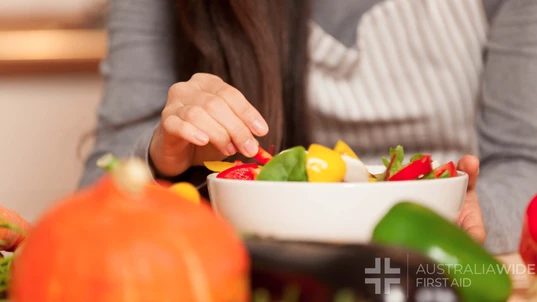
Brightly coloured fruits and vegetable contain many different vitamins and minerals.
Foods to Eat After Surgery
The body is under major stress during surgery, which increases the chances of infection, pneumonia, and limited movement post-surgery. Nutrition is important for an easy transition period after surgery. You should consume the following healing foods after surgery for faster recovery: Whole Grains Add fibre-rich whole grains like oatmeal, brown rice, barley, and quinoa into your post-surgery diet to prevent constipation. Bright-Coloured Fruits Oranges, berries, grapefruit, mango, and peaches are packed with vitamins A and C, carbohydrates, fibre, and antioxidants that will help you recover quickly. Fresh Vegetables Carrots, cabbage, broccoli, cauliflower, and Brussels sprouts have inflammation-fighting antioxidants which help in recovery. However, avoid excessive consumption of vegetables to prevent gas and discomfort. Protein Protein from lean sources like skinless chicken, turkey, trimmed pork, fish, and seafood are important building blocks for tissue and muscle repair. Chinese Soup Chinese soups can be a delightful addition to your post-surgery diet. They contain delicious vegetables and herbs and are often chicken-based, providing essential micronutrients, antioxidants, and protein in a comforting bowl.Foods to Avoid After Surgery
Besides the healthy foods you must eat after surgery, you should know the foods to avoid post-surgery. To heal faster after surgery, prevent these triggering foods:- Low-fibre foods: To prevent constipation caused by medications and reduced mobility post-surgery, avoid low-fibre foods like high-fat meats, eggs, dairy products, and sweets.
- Spicy Foods: Spicy foods are not recommended immediately after surgery, as they may cause gastrointestinal disturbance. Also, too much turmeric and ginger might slow wound healing by affecting blood clotting.
- Alcoholic Beverages: Alcohol can cause dehydration, as well as interacting with medications. This will slow down the healing process.
- Highly Processed Foods: Stay away from highly processed foods like chocolates, frozen desserts, and cold-cut meats post-surgery. They are low in fibre, lack healing nutrients, and cause inflammation.
Wrapping Up
Healing through nutrition is an integral part of the recovery process after surgery, during illness, or post-injury. Consuming nutrient-dense fruits and vegetables, proteins, healing grains and legumes, healthy fats, and water will give your body the nutrients it needs for better healing. Remember the importance of a balanced diet customized to your specific needs. Always talk to a doctor or nutritionist to get personalized advice on the best foods for healing for your particular needs.FAQs
What to Eat After Surgery to Heal Faster? Take proteins along with fruits, vegetables, whole grains, and healthy fats for a fast recovery from surgery. Lean protein, kale, spinach, oranges, berries, quinoa, and barley are the best healing foods after surgery. Also, drink a lot of water to remain hydrated. What Foods to Eat After Surgery to Reduce Swelling? To reduce swelling and inflammation after surgery, eat bananas, strawberries, red onions, capers, pineapple, and papaya. Which Fruit is Good for Wound Healing? The best fruits for wound healing include vitamin C-rich citrus fruits, antioxidant-packed berries, papaya with anti-inflammatory papain enzyme, and bromelain-rich pineapple, aiding inflammation reduction and recovery. What Liquid Foods to Eat After Surgery? Eating solid foods post-surgery can be challenging. To overcome this issue, choose liquid options like broths, soups, smoothies, and meal replacement shakes. These liquid choices will provide essential nutrients till you can transition to your regular diet.
Originally published at
https://www.australiawidefirstaid.com.au/resources/best-foods-for-a-speedy-recovery
as part of the Australia Wide First Aid Articles Library





